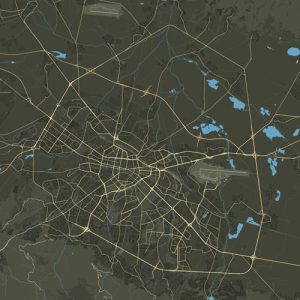Airports in Bulgaria
Bulgaria is served by four international airports: Sofia, Plovdiv, Varna, and Burgas. Varna and Burgas airports primarily operate on a seasonal basis, catering mostly to holiday charters. Sofia Airport stands as the main gateway into Bulgaria, offering a wide range of services and connections. For travelers from Europe looking to save on airfare, low-cost airlines provide affordable options to both Sofia and Plovdiv. Additionally, for those who prefer ground travel, Bulgaria is accessible by car, train, or bus, offering various options to suit different travel preferences and starting points. This connectivity ensures that reaching Bulgaria is convenient, whether you’re flying in for a summer getaway or exploring the region by land.
Trains in Bulgaria
Navigating Bulgaria offers several options, though each comes with its limitations. The country’s train network connects major cities, making it possible to travel by rail to key destinations. However, reaching smaller towns or specific tourist spots, such as those along the Black Sea coast, may require additional transport. For instance, while trains can take you to major coastal cities like Varna or Burgas, you’ll need to switch to a bus or taxi to explore further.
It’s worth noting that train travel in Bulgaria might not be the most comfortable or speedy option. Despite this, certain routes offer uniquely enjoyable experiences, such as the scenic journey from Veliko Tarnovo to Tryavna or Gabrovo. Yet, it’s advisable to avoid long hauls, like traveling from Sofia to Veliko Tarnovo by train, due to inefficiencies.
For accurate and updated information, visit the website of BDZ, Bulgaria’s national railway company.
Tip: A valuable strategy when planning your travel within Bulgaria is to consult with locals. They can offer insightful advice on the best mode of transportation for reaching your desired destination, whether it be by train, bus, or alternative means. Locals’ knowledge can guide you to the most efficient and enjoyable travel experiences across the country.
Buses in Bulgaria
In Bulgaria, buses emerge as the favored mode of transportation, offering extensive coverage and reliability. Several large companies manage the principal routes connecting major cities, while numerous regional operators facilitate travel from these urban centers to outlying areas. This network ensures that both intercity and more localized travel needs are well catered to.
When seeking information about bus services in larger cities, it’s crucial to specify your intended destination. This detail is particularly important because, in some cities like Veliko Tarnovo, different bus stations cater to regional or national routes. Knowing exactly where you want to go helps in providing you with accurate directions to the correct bus station, ensuring a smoother travel experience.
This bus-centric system underscores the importance of buses in Bulgaria’s public transport landscape, making them a reliable and accessible option for navigating the country. Whether you’re planning to explore major urban areas or venture into more secluded regions, the bus network facilitates convenient travel across Bulgaria.
Taxis in Bulgaria
Taxis in Bulgaria offer an affordable and popular means of transportation within big cities and for short intercity distances. Characteristically, all official taxis in Bulgaria are painted yellow, making them easy to identify. A taxi’s availability is indicated by a light system: a green light on the front shield, positioned at the left corner above the passenger’s seat, signifies that the taxi is free, while a red light indicates it is occupied. In larger cities, you will find designated taxi stands where taxis are permitted to wait for passengers. Alternatively, you can hail a taxi directly from the street with a simple wave.
Tip: Travelers should exercise caution to avoid falling prey to fake taxis and taxi scams, particularly prevalent in tourist-heavy areas and Sofia. These scams follow patterns similar to those encountered worldwide. It’s essential to stay vigilant, use common sense when choosing a taxi, and familiarize yourself with common scams. Researching or reading articles on taxi scams in Sofia and gathering tips on safely catching a taxi in Bulgaria can provide valuable insights and enhance your travel experience while ensuring your safety and avoiding overcharges.
Getting around by car in Bulgaria
Traveling by car in Bulgaria offers the freedom to explore some of the country’s most stunning locations, many of which are only accessible by road. However, it’s important to be aware of the state of the road infrastructure before setting out. Bulgaria boasts only two fully completed highways and two others that are partially finished, alongside various segments of roads still under construction. A significant portion of the roads outside these major routes are in poor condition, with some featuring potholes large enough to be considered craters.
When driving in Bulgaria, caution is advised due to the driving habits of some individuals who may not follow traffic regulations closely, compounded by occasional inadequate road markings. Despite these challenges, the opportunity to discover Bulgaria’s hidden gems by car should not be dismissed lightly. Preparedness and careful driving can lead to an unforgettable journey.
Bulgaria does not have toll roads, but vehicle owners are required to purchase a vignette for road usage. Detailed information on vignette prices and purchasing procedures can be found on the official website of the Bulgarian road authorities.
Tip: Consider embarking on a road trip across Bulgaria for an adventurous way to experience the country’s diverse landscapes and cultural heritage. There are numerous itineraries available, including a recommended 7-day road trip that spans from the north to the south of Bulgaria, showcasing an array of remarkable destinations along the way.

